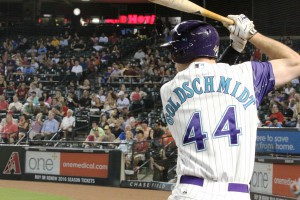- Slug: Sports-HUMIDOR, 730 words
- Photo available
By KACI DEMAREST
Cronkite News
PHOENIX — Chase Field is often described as a hitter’s paradise and a pitcher’s nightmare, but with the impending installation of a humidor, the Arizona Diamondbacks are looking to change that.
The Diamondbacks will become just the second team in Major League Baseball to use a humidor, a room that regulates the temperature and relative humidity of baseballs. As part of a nine-step ball-handling procedure introduced at the 2015 MLB winter meetings, baseballs must be kept at 70 degrees with 50 percent relative humidity to ensure consistency among all 30 teams.
“There will be a fairly substantial reduction in the amount of home runs hit at Chase Field. Now, exactly what that number is, I can’t really say with any precision,” said Alan Nathan, a professor emeritus at the University of Illinois who regularly applies physics to baseball. “In either result, it’s going to be substantial, somewhere between a 25 and 50 percent reduction in the number of home runs.”
The humidor is expected to be installed within the next month.
The only other ball club in the league that has a humidor is the Colorado Rockies, who implemented one in 2002. Coors Field is home to the highest elevation in all of the majors as it sits at 5,280 feet. Chase Field comes in second at 1,086 feet.
“We’re following the guidelines, and nobody wants to break any rules, and we know what we’re challenged with here,” Diamondbacks manager Torey Lovullo said. “It gets very hot and it’s easy for those balls to get a little bit distorted and that won’t be the case anymore.”
Three properties of a baseball change when it’s introduced to the humidor, Nathan said, but only two affect its speed. When the ball absorbs water, it gets bigger, but the size is too minimal to make an impact. However, the ball’s coefficient of restitution, or the bounciness of the ball, and the weight of the ball from water absorption affect the exit speed.
Nathan used two methods to calculate the effect: Statcast data and physics theories. From his calculations, he predicted the exit speed of the baseball will decline by two to four miles per hour.
David Kagan, a physics professor at California State University-Chico, agrees the humidor will make a difference but believes the organization should think more about how it will affect its hitters more than its pitchers.
“Currently, Chase Field is consistent with almost all of the other major league ballparks, except Coors Field, in terms of the number of home runs per at bat,” Kagan said. “It’s right in there with the rest of them. The biggest effect is not going to be better pitching. It’s going to be that there’s going to be fewer home runs.”
The biggest impact comes from the humidity, not the elevation, because humidity has a direct effect on the ball.
“The humidor only solved a part of the problem in Colorado,” Kagan said. “The other part of the problem is the air the ball travels through when it’s in play. That air is thin, much thinner than Arizona, and the only way to fix that would be to dome the stadium and have the air system within the stadium to change the pressure of air. “
Kagan said when the Rockies installed their humidor, there was an agreement throughout the league that something needed to be done in Colorado. When it comes to Chase Field, that’s not typically the case.
“The home run production rate varies ballpark to ballpark depending on the humidity, depending upon the altitude of the ballpark, and Chase Field is right in there in terms of home runs per at bat,” Kagan said. “It’s going to become one of the harder, in fact the hardest, places to hit a home run if they use the humidor.”
Diamondbacks pitcher Jorge De La Rosa pitched for the Rockies for nine seasons. He said he is looking forward to seeing how the ball will fly inside Chase Field.
“It’s going to help a little bit,” De La Rosa said. “You’re really going to feel the difference when you pitch. The grip is going to be better.”
Kagan believes the Diamondbacks’ decision is a significant one.
“I think Major League baseball and the Diamondbacks need to think really hard about the repercussions of putting in a humidor and how that’s going to affect the game,” he said.
